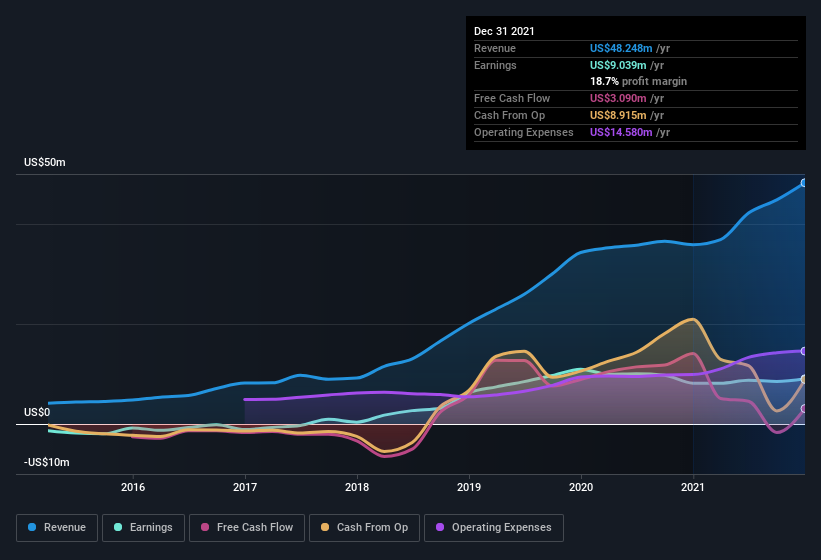With EPS Growth And More, CoreCard (NYSE:CCRD) Is Interesting
Some have more dollars than sense, they say, so even companies that have no revenue, no profit, and a record of falling short, can easily find investors. But as Warren Buffett has mused, 'If you've been playing poker for half an hour and you still don't know who the patsy is, you're the patsy.' When they buy such story stocks, investors are all too often the patsy.
In contrast to all that, I prefer to spend time on companies like CoreCard (NYSE:CCRD), which has not only revenues, but also profits. Now, I'm not saying that the stock is necessarily undervalued today; but I can't shake an appreciation for the profitability of the business itself. Loss-making companies are always racing against time to reach financial sustainability, but time is often a friend of the profitable company, especially if it is growing.
View our latest analysis for CoreCard
How Fast Is CoreCard Growing?
The market is a voting machine in the short term, but a weighing machine in the long term, so share price follows earnings per share (EPS) eventually. That makes EPS growth an attractive quality for any company. We can see that in the last three years CoreCard grew its EPS by 14% per year. That growth rate is fairly good, assuming the company can keep it up.
One way to double-check a company's growth is to look at how its revenue, and earnings before interest and tax (EBIT) margins are changing. On the one hand, CoreCard's EBIT margins fell over the last year, but on the other hand, revenue grew. So it seems the future my hold further growth, especially if EBIT margins can stabilize.
The chart below shows how the company's bottom and top lines have progressed over time. For finer detail, click on the image.
Fortunately, we've got access to analyst forecasts of CoreCard's future profits. You can do your own forecasts without looking, or you can take a peek at what the professionals are predicting.
Are CoreCard Insiders Aligned With All Shareholders?
It makes me feel more secure owning shares in a company if insiders also own shares, thusly more closely aligning our interests. So it is good to see that CoreCard insiders have a significant amount of capital invested in the stock. Given insiders own a small fortune of shares, currently valued at US$74m, they have plenty of motivation to push the business to succeed. At 28% of the company, the co-investment by insiders gives me confidence that management will make long-term focussed decisions.
It means a lot to see insiders invested in the business, but I find myself wondering if remuneration policies are shareholder friendly. A brief analysis of the CEO compensation suggests they are. I discovered that the median total compensation for the CEOs of companies like CoreCard with market caps between US$100m and US$400m is about US$1.2m.
CoreCard offered total compensation worth US$704k to its CEO in the year to . That comes in below the average for similar sized companies, and seems pretty reasonable to me. While the level of CEO compensation isn't a huge factor in my view of the company, modest remuneration is a positive, because it suggests that the board keeps shareholder interests in mind. It can also be a sign of good governance, more generally.
Is CoreCard Worth Keeping An Eye On?
One important encouraging feature of CoreCard is that it is growing profits. Earnings growth might be the main game for CoreCard, but the fun does not stop there. Boasting both modest CEO pay and considerable insider ownership, I'd argue this one is worthy of the watchlist, at least. We don't want to rain on the parade too much, but we did also find 2 warning signs for CoreCard (1 is a bit unpleasant!) that you need to be mindful of.
You can invest in any company you want. But if you prefer to focus on stocks that have demonstrated insider buying, here is a list of companies with insider buying in the last three months.
Please note the insider transactions discussed in this article refer to reportable transactions in the relevant jurisdiction.
Have feedback on this article? Concerned about the content? Get in touch with us directly. Alternatively, email editorial-team (at) simplywallst.com.
This article by Simply Wall St is general in nature. We provide commentary based on historical data and analyst forecasts only using an unbiased methodology and our articles are not intended to be financial advice. It does not constitute a recommendation to buy or sell any stock, and does not take account of your objectives, or your financial situation. We aim to bring you long-term focused analysis driven by fundamental data. Note that our analysis may not factor in the latest price-sensitive company announcements or qualitative material. Simply Wall St has no position in any stocks mentioned.

